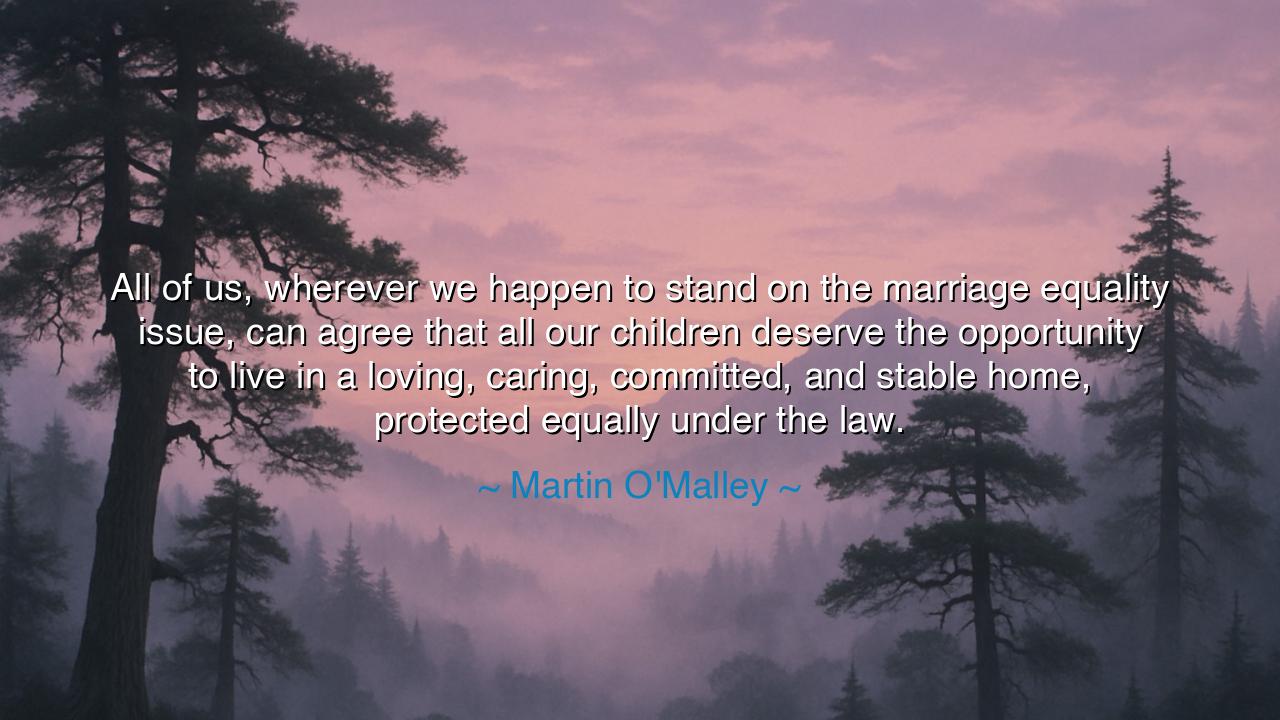
All of us, wherever we happen to stand on the marriage equality
All of us, wherever we happen to stand on the marriage equality issue, can agree that all our children deserve the opportunity to live in a loving, caring, committed, and stable home, protected equally under the law.






“All of us, wherever we happen to stand on the marriage equality issue, can agree that all our children deserve the opportunity to live in a loving, caring, committed, and stable home, protected equally under the law.” — Martin O’Malley
In these noble and conciliatory words, Martin O’Malley, former Governor of Maryland, speaks as one who seeks harmony amid division. His statement, born in the heat of public debate over marriage equality, rises above partisanship and ideology. He does not demand agreement on every principle, but calls upon a shared foundation — love, stability, and the well-being of children. O’Malley’s wisdom lies in his understanding that the heart of society is not its laws alone, but the homes that nurture its future. His voice, calm and measured, reminds us that beyond the tumult of politics lies a truth older than any government: that every child, regardless of their parents’ identity or circumstance, deserves to grow in the safety of unconditional love.
The origin of this quote comes from O’Malley’s advocacy for the legalization of same-sex marriage in Maryland in the early 2010s. At that time, the nation was torn between tradition and transformation, between ancient definitions of marriage and the modern recognition of equality. O’Malley, though a Catholic, stood for justice under the law, believing that civil institutions must reflect the dignity of all families. In his words, one hears not the clamor of ideology, but the compassion of leadership — a reminder that true governance serves the people not by dividing them, but by unifying them through shared humanity.
The heart of his statement beats with an ancient rhythm — the understanding that the family is the cornerstone of civilization. Whether in the temples of Greece, the villages of Africa, or the empires of the East, the home has always been the sacred place where virtue is born, where compassion is taught, and where the future is formed. O’Malley does not seek to redefine this truth, but to extend it — to say that love and commitment, not the form of the union, are what make a home holy. He reminds us that children thrive not because of the law’s endorsement of structure, but because of the presence of love within that structure.
History offers many mirrors to this truth. In the days of ancient Rome, families were seen as the foundation of the republic — yet the empire’s strength declined when greed and prejudice corroded the sanctity of the household. Likewise, in modern times, societies that have embraced compassion and inclusion have found renewal, while those that have clung to exclusion have withered in bitterness. The progress of justice, from the abolition of slavery to the enfranchisement of women, has always begun with the recognition that love and dignity belong to all. O’Malley’s vision continues that lineage — not as rebellion against tradition, but as its fulfillment.
His words carry a quiet moral power, for they appeal not to doctrine, but to conscience. By saying, “wherever we happen to stand,” he honors the diversity of belief. He does not dismiss those who hold traditional views of marriage; instead, he invites them into common cause — to care for the next generation, whose innocence should never be shadowed by the conflicts of adults. In this, he embodies the wisdom of the ancients, who taught that a just society is one where the strong protect the weak, and where every child, regardless of birth, is seen as a bearer of divine potential.
The lesson of this quote is timeless: love is the foundation of justice. Law without compassion becomes tyranny, and belief without empathy becomes cruelty. O’Malley reminds us that society’s greatness is not measured by whom it excludes, but by how fully it embraces the humanity of all its members. To ensure that every child lives in a stable, loving home is to fulfill the highest duty of civilization itself.
Let this teaching be preserved for those who walk after us: do not let differences in creed or custom blind you to the deeper bond that unites all — the need for love, safety, and belonging. Build homes that welcome, not walls that divide. Defend the right of every child to grow in the light of affection and equality. For as Martin O’Malley teaches, justice is not the privilege of the few, but the promise to the future — that every child, born into this world of hope and struggle, shall be protected equally under the law, and loved without measure in the home that shapes their soul.






AAdministratorAdministrator
Welcome, honored guests. Please leave a comment, we will respond soon